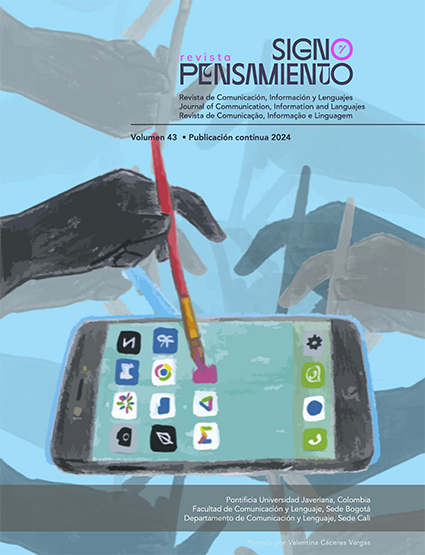To the rescue of the subject in sociodigital networks: Anthropological study on the appropriation and socialization of political information in Uruguay
##plugins.themes.bootstrap3.article.details##
This article presents the results of the second stage of an anthropological research on the appropriation and socialization of political information in Uruguay. Its fundamental premise is to recover the subjects' perspective in the inquiry into the meaning of their practices through in-depth interviews. In this stage, our focus was twofold: first, to explore the modes of coexistence in sociodigital networks, particularly the role played by the "silence" resource in managing and mitigating conflict; and second, to explore the influence of territory and locality in the various socio-technical networks of sociability that individuals engage in. The findings allow for lessening the impact of polarization and the filter bubble on the selection, interpretation, and validation of significant political information among diverse social actors.
Sociodigital networks, Appropriation of political information, Silences, TerritoryRedes socio-digitales, Apropiación de información política, Silencios, Territorio
Berteaux, D. (2005). Los relatos de vida. Perspectiva etnosociológica. Barcelona, Belaterra.
Calvo, E. y Aruguete, N. (2020). Fake news, trolls y otros encantos. Buenos Aires, Siglo XXI.
Castells Manuel (2022) Conferencia Inaugural: “América Latina entre el miedo y la esperanza” Congreso de Clacso 2022. Recuperado de: https://www.youtube.com/watch?v=Oh3ze8zXnrw
Giménez, G. (2019). Cultura, identidad y procesos de individualización. En Laura Loeza Reyes y Martha Patricia Castañeda (coords.) Identidades: teorías y métodos para su análisis (pp.15-28). México. UNAM. Recuperado de: https://ru.ceiich.unam.mx/handle/123456789/307
Glaser, B. G. & Strauss, A. L. (1967). The Discovery of Grounded Theory: Strategies for Qualitative Research. United States of America, Aldine Transaction.
Guber, R. (2004). El salvaje metropolitano. Buenos Aires, Paidós Estudios de Comunicación.
Imaz, C. (2011). Descongelando al sujeto. Subjetividad, narrativa e interacciones sociales contextualizadas. Acta Sociológica, (56), 37-57. doi: http://dx.doi.org/10.22201/fcpys.24484938e.2011.56.28612
Keane, J. (1997). Transformaciones estructurales de la esfera pública. Revista Estudios Sociológicos Colegio de México, XV(43), enero-abril.
Latour, B. (2008). Reensamblar lo social. Una introducción a la teoría del actor-red. Buenos Aires, Manantial.
Levebvre, H. (1974). La producción del espacio. Madrid: Colección Entrelíneas.
Massey, D. (2009). Concepts of space and power in theory and in political practice. Documents d'anàlisi geogràfica, (55), 15-26.
Mazzei, E. (2013). Fronteras que nos unen y límites que nos separan. Melo: Imprenta CBA.
Matassi, M., Boczkowski, P.J. (2020). Redes sociales en Iberoamérica. Artículo de revisión. El profesional de la información, 29(1). https://doi.org/10.3145/epi.2020.ene.04
Morley, D. (2008). Medios, modernidad y tecnología. Barcelona, Gedisa.
Newman, D. (2003). On borders and power: a theoretical framework. Journal of borderlands studies, 18(1), 13-25.
Noëlle-Neumann, E. (1995). La espiral del silencio. Opinión pública: nuestra piel social. Barcelona, Paidós.
Porta, M., Álvarez, Y. (2017). Acerca de la vulnerabilidad en las sociedades fronterizas. Revista Las sociedades fronterizas, visiones y reflexiones, 1st ed. [online] Montevideo. http://www.cci.edu.uy/publicaciones/cci-13/13.pdf (Acceso 20 /1/ 2018).
Rúas Araújo, X., Casero-Ripollés, A. (2018). Comunicación política en la época de las redes sociales: lo viejo y lo nuevo, y más allá. adComunica. Revista Científica de Estrategias, Tendencias e Innovación en Comunicación, (16), 21-24, https://raco.cat/index.php/adComunica/article/view/342949. doi: http://dx.doi.org/10.6035/2174-0992.2018.16.2
Silverstone, R. (1996). Televisión y vida cotidiana. Buenos Aires, Amorrortu.
Valenzuela, S., Somma, N.M., Scherman, A., Arriagada, A. (2016). Social media in Latin America: deepening or bridging gaps in protest participation?. Online Information Review, 40(5), 695-711. Recuperado de: https://repositorio.uc.cl/xmlui/bitstream/handle/11534/33038/Social%20media%20in%20Latin%20America%20deepening%20or%20bridging%20gaps%20in%20protest%20participation..pdf
Vera, S. (2015). Estudios culturales/estudios de audiencia: clase, política y tecnología. Entrevista con David Morley, traducida por André Dorcé. Versión. Estudios de Comunicación y Política, 36(septiembre-octubre), 178-186, Recuperado en:
Wajcman, J. (2017). Esclavos del tiempo. España, Paidós.
XXX (XXXX)
WOLTON, D.(1995). La comunicación política: construcción de un modelo. Barcelona, Gedisa.

This work is licensed under a Creative Commons Attribution 4.0 International License.


